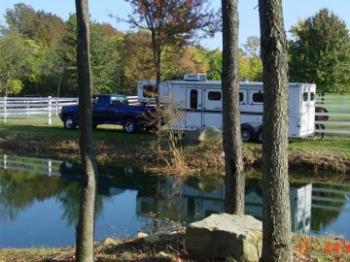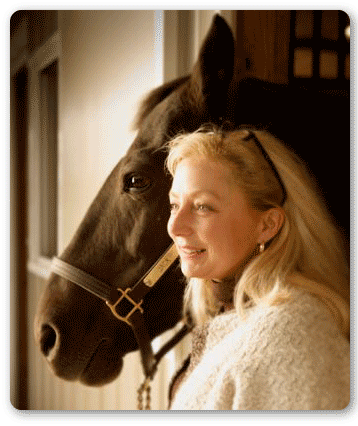Five Tips for Trailer Organization

But following these five simple tips will help you keep your trailer neat and organized all season long.
Make sure your truck and trailer are in good repair.
Inspect floorboards, check that lights and brakes are working properly, and examine tires for wear-and-tear and correct air pressure. This maintenance will not only prevent mishaps while on the road, but will ensure that your trailer is in good repair at all times.
Utilize all the space in your trailer
Today, most trailers are equipped with dressing rooms and tack storage areas. These areas make storing clothing and horse items much easier. I have found that using clear, plastic totes for items such as bandages, leg wraps and blankets make storing them and finding them easier. Storage totes are stackable, can be labeled for easy identification and often fit into small, otherwise wasted spaces. Plastic multi-drawer organizers are also convenient for personal items. They fit neatly in a corner and can be used for a variety of things such as bug repellent, first aid kits and small items that often get lost such as bobby and safety pins. For horse items, grooming totes make spray bottles and brushes easy to reach and carry. These useful, plastic totes save valuable time and can be used when you warm up or put those final touches on a show horse.
Keep all show outfits together
When packing for a show, storing each complete outfit (hat, jeans, boots, shirt, vest, hair accessories, jewelry and chaps for Western; helmet, breeches, shirt, collar, boots, jacket and gloves for English) separately makes quick tack changes easier. Knowing where everything is will keep you from wasting valuable warm-up time searching for that one missing glove or shirt collar.
Pre-package grain and supplements
If you are going to a weekend show, storing grain in resealable plastic bags will save room in your trailer and make feeding time easier. Measure out the amount of grain that each horse receives per feeding, and place it in individual bags. Then add any supplements, medications, etc., to the pre-measured amount. Label each bag with the horse's name to ensure that there are no mix-ups if you are taking more than one horse to a show. Don't forget to mark which bags contain the supplements or medications, since most supplements are only given once a day.
Keep tack stored in saddle cases and bridle bags
Saddle cases and bridle bags are other great products that help utilize the space in small trailers. They protect expensive show tack from becoming scratched and eliminate tangling of bridles and halters since each item is neatly contained in its own bag. Saddle pad carriers also protect expensive western show blankets and allow each pad to be neatly folded, making them easier to find when several are stored in one bag. It is imperative that sweaty blankets are allowed to dry thoroughly before being stored so that molding and mildewing do not occur. Several companies carry ready-made saddle cases and bridle bags, or if you enjoying sewing, there are patterns available to make your own. Saddle cases and bridle bags come in a variety of colors and can even be embroidered with your initials or your farm name.
Following these five easy steps will not only keep your trailer neat and organized, but will also make showing more enjoyable. Looking for misplaced items can be irritating and frustrating-especially if they are doing first call for the class that you are supposed to be in! After all, showing is supposed to be fun and relaxing. So go out, get organized and have fun.
 Debbie has over 45 years experience with horses and equine-related businesses. She has owned, trained, boarded horses and run stables at various times in her career. She is a certified fence installer, has given balanced riding lessons, and has shown horses in Western, Western Pleasure, Trail, English, Hunter/Jumper, Fox Hunting, Hunter Trials, Dressage and driving classes. Debbie has been involved in foaling, and just about every aspect of horse ownership possible, and she welcomes your questions and comments. If you are interested in using any articles by Debbie, please send her an email.
Debbie has over 45 years experience with horses and equine-related businesses. She has owned, trained, boarded horses and run stables at various times in her career. She is a certified fence installer, has given balanced riding lessons, and has shown horses in Western, Western Pleasure, Trail, English, Hunter/Jumper, Fox Hunting, Hunter Trials, Dressage and driving classes. Debbie has been involved in foaling, and just about every aspect of horse ownership possible, and she welcomes your questions and comments. If you are interested in using any articles by Debbie, please send her an email.
RAMM Fence Systems, Inc. makes every effort to provide reliable and useful information on horse health, care and products. The statements made on this website are based on years of experience with horses, however, they are based on generalized situations and should not replace diagnosis or treatment by a veterinarian or consultation by a professional. RAMM Fence Systems, Inc. does not assume any legal responsibility. Readers should always consult qualified health care providers for specific diagnosis and treatment.
